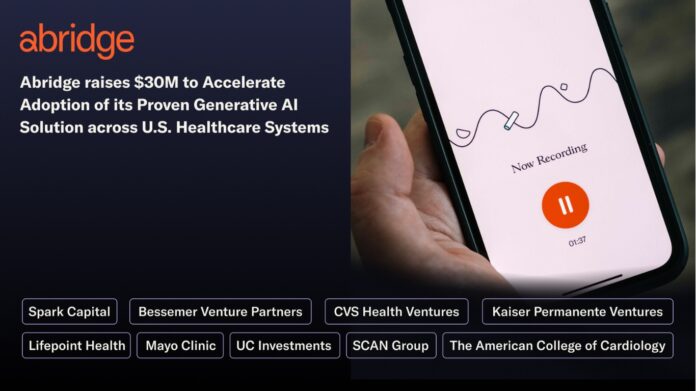
Abridge, the leader in generative AI for clinical documentation, announced a Series B raise of $30 million, led by Spark Capital. The round also included existing investor Bessemer Venture Partners, as well as several leading healthcare innovators including CVS Health Ventures, Kaiser Permanente Ventures, Lifepoint Health, Mayo Clinic, SCAN Group, UC Investments (University of California), and the American College of Cardiology. This investment will support large-scale health system rollouts and accelerate product advances that will create additional value for patients, clinicians, and health systems.
“Spark Capital is proud to lead this industry-defining investment in Abridge,” said Will Reed, a General Partner at Spark Capital focused on growth stage AI investments. “We chose to invest in Abridge based on their deep AI-native talent led by Zack Lipton (Chief Scientific Officer), their commitment to building solutions around deep clinical workflows, and the overwhelming positivity from customers.”
Abridge’s software automatically converts a patient-clinician conversation into a structured clinical note draft in real-time, leveraging their proprietary AI pipeline. The solution has been proven to save clinicians over two hours per day from administrative burden that previously took time away from patients and detracted from clinician work-life balance. In recent implementations, over 91% of notes across over 40 specialties were drafted solely with their AI, requiring minimal input from the clinician. The solution has been uniquely designed with trust and auditability, providing the ability to quickly see source data from any AI-generated summary.

“We share Abridge’s vision of doing all we can to help clinicians focus on their patients, rather than needing to multitask with documentation,” said Dr. John D. Halamka, President of the Mayo Clinic Platform.
“At UCI Health (University of California Irvine), our dedicated focus is on enhancing operational efficiency and simplifying documentation for our physicians and caregivers. The decision to invest in Abridge reflects our commitment to achieving these goals and, importantly, addressing clinician burnout. We recognize the impact of streamlined processes in alleviating the burdens on our healthcare professionals,” said Scott Joslyn, Chief Innovation Officer of UCI Health. “We are excited to forge this partnership with Abridge and Dr. Shiv Rao’s team.”
A few weeks ago, Epic named Abridge the first Pal in its “Partners and Pals” program. Abridge’s solution is now available for a deep unique integration in Epic’s clinical workflows, giving clinicians the ability to seamlessly integrate real-time, structured summaries of patient conversations. The partnership also enables full implementation in as little as two weeks. There have already been several successful health system deployments of Abridge’s Epic-integrated solution, including The University of Kansas Health System, UPMC, and Emory Healthcare, among many others.
“We are encouraged by the enthusiasm of thousands of clinicians who use Abridge every day and we look forward to collaborating with this talented team,” said Vijay Patel, managing partner and co-founder of CVS Health Ventures. “Our shared focus on innovation in healthcare can help enhance the work Abridge is doing across a range of clinical use cases including primary care.”
“The investment and support of these iconic institutions is a game-changer for Abridge, dramatically accelerating what we can do to solve a critical issue facing every health system,” said Dr. Shiv Rao, co-founder and CEO of Abridge. “We are grateful to have an extraordinary and rapidly expanding group of partners who share our ambition to preserve the empathy and humanity in healthcare by enabling clinicians to be more present with their patients.”





